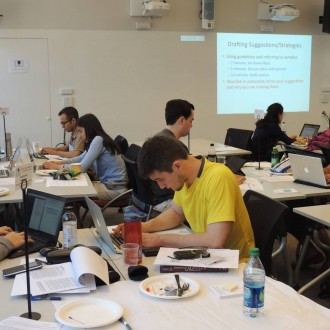Last Saturday, I joined around forty students and faculty members gathered in the Mathey common room as part of Principedia’s fall Hackademics. The goal? In the words of McGraw Associate Director Nic Voge, sharing what students have learned about the hidden curriculum at Princeton.

Whether or not they call it by name, most students have recognized the “hidden curriculum” of learning expectations and demands behind every Princeton course. I’ve often had to puzzle out the best learning strategies for my classes– from watching MAT 202 video review sessions before exams to talking through principal parts with friends in language classes– by trial and error. Online course evaluations are usually emotionally-charged and of limited help, and professors and TAs don’t always give students concrete advice.
Hackademics, the first in a series of events throughout the year, was a time for students to come together for food, prizes, and company while writing course articles that described effective learning strategies for any class of their choosing. Writing articles helped me reflect on the strategies that worked best for me in the past and apply them to my current related classes. For example, when I wrote my article on MAT 202, I realized that consolidating notes and incorrect questions on practice exams helped me succeed on the final exam. I started implementing the same strategy early on in COS 226. Students around me wrote about classes ranging from CLG 103 (Intensive Ancient Greek) to AST 204 (Topics in Modern Astronomy).
All the articles from Hackademics will soon be available on Principedia, the umbrella project behind this event. Principedia is a unique resource that allows Princeton students to learn from peers who have recently been in their shoes– imagine Wikipedia, but for advice on learning strategies to employ in courses. On Principedia, students can collaboratively write articles on how to optimize one’s experience in any Princeton course. Key parts of any course article include a description of course goals followed by ideas about how to learn from classroom instruction, assessments, assignments, and external resources. Articles already published on the site span 22 classes in 18 departments.
Principedia is also an exciting tool for student researchers at any stage of the research process. Browsing through strategies for effective classroom learning, time management, and interactions with professors can give you hints about how to best approach reading literature and drafting questions for research papers. Reading students’ experiences in classes across different subject areas also has the potential to inspire you to take a class that broadens your academic perspective!
And, one final announcement– If you’re a freshman interested in helping with Principedia or, more importantly, gaining insight into learning strategies, stop by the Wilson PDR this week anytime between 12-2 pm on Tuesday and Wednesday to help judge course article submissions from Hackademics! If you’re interested in participating in the development of Principedia, regardless of class year, email Nic Voge– nvoge@princeton.edu.
–Vidushi Sharma, Humanities Correspondent

